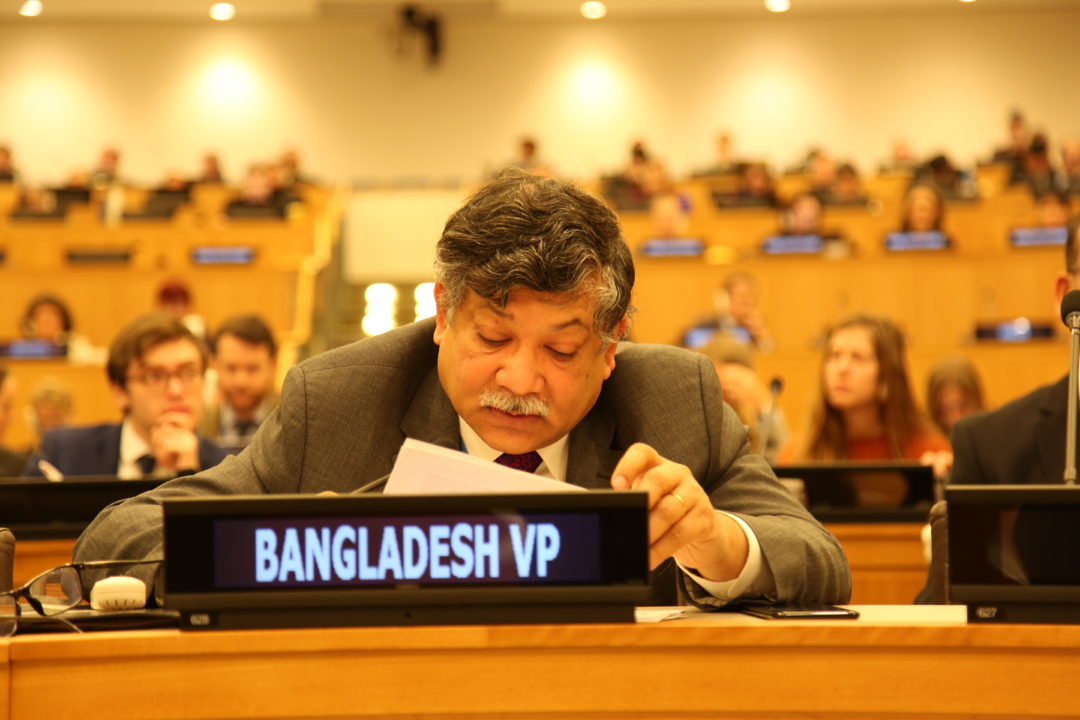I thank you, Madam Moderator for giving me the floor.
I thank the Permanent Missions of Turkey and Norway, European Eunion, IFRC, and Turkish Red Crescent Society for organizing this event today. We appreciate its focus on cash programming in the era of COVID-19 and beyond.
The pandemic has hit the poorest and the most marginalized groups of our soicieties the hardest. Millions of people have been pushed into poverty and hunger. The inequalities have increased both within and across societies . The health systems in most countries have been shattered. Children’s education faces a “generational catastrophe”. Malnutrition has risen for children who depend on school feeding programmes.
Against this backdrop, we stress the importance of scaling up cash programming. Direct cash transfers can have transformative impacts on delivery of social safety net services, especially by reducing the distribution challnegs, transfer cost, leakages, middlemanships, and other systemic losses.
In Bangladesh, we have taken up a multi-pronged approach to tackle the adverse impacts of the pandemic. For helping the most marginalized people and critical sectors of our economy, the Government has declared an ambitious budget of about 72 billion US$ with enhanced fiscal measures and social safety net coverage. Earlier, the Government rolled out 28 stimulus packages to the tune of US$ 14.6 billion. Direct cash tranfer has been identified as an essential delivery tool to make these initiatives succesful.
Even before the pandemic, we had some successful national cash transfer programmes. ‘Old Age Allowance’ and ‘Widowed and Distressed Women Allowance’ are two promimenet ones among those. Our National Social Security Strategy 2015 has laid out specific roadmap to institutionalize direct cash transfer.
During the pandemic , these helped us scaling up Government to Person(G2P) delivery system to reach those who are the furthest behind in the most transparent and accountable manner. We have already disbursed US$ 166 million in the form of direct cash transfers to more than 4.44 million people. The poor, elderly, widows, disabled persons, day-labourer, farmers and informal sector workers are the top beneficiaries. Our advancements in digital inclusion helped ensuring direct cash transfers to various beneficiary group via Mobile Financial Services and Banking channels in efficient and transparent manner.
Distinguished participants,
Cash transfer programs have played a key role to protect millions of poor and disadvantaged people around the world during this pandemic. Yet , there are there are daunting challenges in establishing effective delivery solutions of direct cash transfers, especially for those who are unbanked and digitally unconnected.
Let me share a few specific thoughts in this regard:
First, the pandemic has shown the effectiveness of digital cash transfer to reach the last mile beneficiearies when the traditional ways become ineffective. Yet many countries lack essential infrastructure and ecosystem to reap the maximum benefits of digital financial services and fintechs. It is imperative to invest more in the areas of digital connectivity, digital lilliteracy, and data security to bridge this gap.
Second, the low income countries are facing serious fiscal constrainsts due to the pancemic. To enable them to go for ambitious cash transfer programmes, they need enhahned support measures from the multilateral and regional financial institutions. The World Bank and IMF need to scale up their emergency support measures, as well as reduce bureaucracy and conditionality to ensure timely access of the low income countries to emergency funds.
Third, we need a multistakeholder approach to make cash transfer programmes successful.
There should also be strong coordination among Governments, NGOs, and UN agencies to avoid a situation where some people receive benefits from multiple sources while others are completely left behind.
Finally, cash transfers should be linked with creation of livelihood opportunities and driving socio-economic changes.
To this end, we encourage right balance of conditional and unconditional cash transfers and proper monitoring of the end-use of the cash to drive expected results. Conditional Cash transfers can be leveraged to drive socio-economic changes, for example, co-management of natural resources, afforestation, girls education, etc.
The development and huminatrian actiors need to work in a more collaborative and coordinated manner to find the appropriate balance in this regard, especially in the time of major crisis. The humanitarian agencies working in Cox’s Bazar, Bangladesh have introduced some innovative solutions to transfer cash through digital means in coordination with Government agencies.
I would like to rest it here. We have a rich panel of disucsants to elaborate on some of these issues. I look forward to a fruitful discussions.
I thank you all.
********

